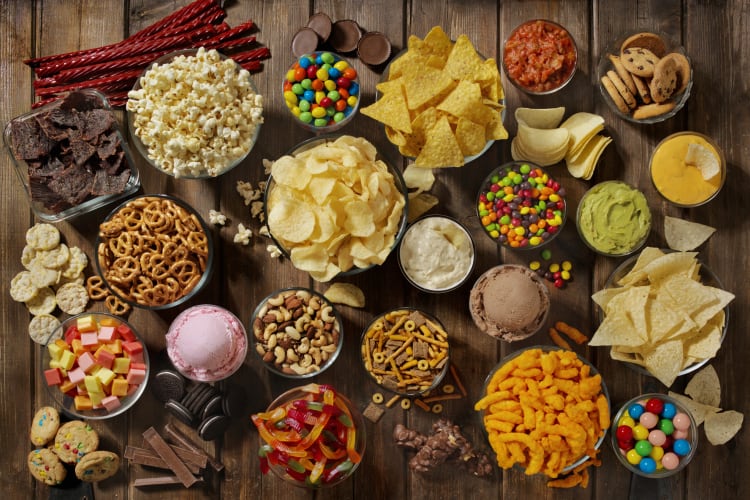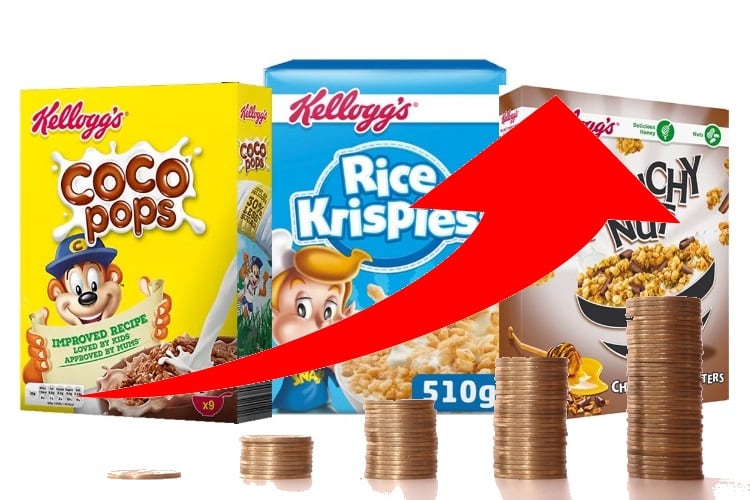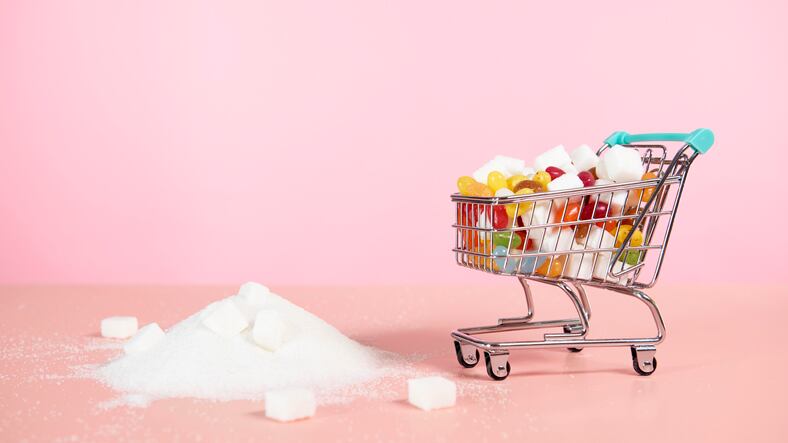Over half of the ‘flagship’ products produced for the UK market by five of the largest global food companies are high in fat, salt or sugar (HFSS), new research suggests.
Researchers from Action on Salt, the expert group based at Queen Mary University of London, and supported by ShareAction, have identified what they describe as ‘100 key flagship products’ manufactured by Danone, Kellogg’s, Kraft Heinz, Nestlé and Unilever. Over half of these products would be considered unhealthy and awarded a red colour-coded warning label under the UK’s nutrient scoring system.
Moreover, of surveyed products that were featured in the Department of Health’s 2020 salt reduction programme, over a third failed to meet their respective health targets.
“It’s a national scandal that most of these big food companies are blatantly contributing to the number of people dying and suffering unnecessarily from strokes and heart disease, which remains the biggest cause of death in the UK. Improving the nutritional content of foods by reformulating recipes with less salt, sugar and saturated fat is by far the most important strategy to prevent obesity and heart disease,” said Graham MacGregor, Professor of Cardiovascular Medicine at Queen Mary University of London and Chair of Action on Salt.
“Fundamentally, we need these companies to be more responsible and for the Government to take full control with strict measures to include mandatory targets for reformulation, well enforced marketing and promotions restrictions (including shortening the delay to ban multi-buys and advertising) and better food-labelling requirements.”
Best and worst performers
Danone was found to have the ‘lowest proportion’ of flagship products that score as less healthy, with just two in the 20 products examined falling into the red category. This, the campaigners said, shows ‘companies can still be profitable even if they increase the proportion of healthy vs less healthy products they sell’.
The researchers singled out Kellogg’s and Unilever in particular, noting that nearly two-thirds of their products were considered ‘less healthy’. Of the Unilever products in the DoH salt reduction programme, two in three didn’t meet reformulation targets.
Action on Salt noted that poor performing companies are likely to be more impacted by forthcoming changes to promotional and marketing rules on unhealthy products when the country’s HFSS restrictions come into force.
The first phase of restrictions limiting unhealthy products being promoted in prominent places in store, such as checkouts, will come into effect in October. However, campaigners were critical of what they characterised as government inaction on HFSS following delays to implementation.
“Unfortunately, it seems that with the Government failing to properly enforce salt and sugar targets, or to implement much-needed public health legislation - producing healthy, nutritious food is just not a priority for all of these big food companies,” Hattie Burt, Policy & Communications Officer at Action on Salt, suggested. “These foods can and should be improved to contain less salt, sugar and saturated fat, and more fibre, protein, fruit and vegetables. If retailers and smaller food manufacturers can achieve it, so can these big multinational organisations.”
Leveraging ‘health halos’ for unhealthy foods
The study authors insisted that the failure to reformulate products from multinationals stands in ‘start contrast’ to the image they cultivate.
Indeed, almost two-thirds of products included in the survey display nutrition, health and sustainability-based claims as part of their product description. “With the exception of Danone, the findings from this survey suggest this practice is widespread with over a third of all companies’ unhealthy flagship products surveyed using a nutrition or health-based claim,” the authors noted.
Although this practice is legal, Action on Salt stressed that health halos can ‘mislead consumers’.
Kellogg’s was found to be ‘the worst offender’ with health or nutrition claims on almost three quarters of their less healthy food products included in the snapshot survey.
“Making health claims on unhealthy products should raise ethical concerns about the behaviour of these companies. We call on global food companies to shift their marketing from such an approach to one that champions genuinely healthier options,” the organisations insisted.
Companies are also able to mitigate profit losses while supporting public health if they shift their marketing and advertising towards healthier options, it was suggested. Kellogg’s could suffer revenue losses in the region of £100m if they do not adapt to the new HFSS environment, they noted.
“While some manufacturers are taking steps to increase their sales of healthy foods, the overall picture is of an industry lagging behind,” warned Ignacio Vazquez, Head of Health at ShareAction. “Investments in companies over-reliant on the sales of unhealthy foods are fast becoming stranded assets. We have seen the UK retail market respond to these issues by setting clear targets to increase their sales of healthy foods over time. Shareholders of food manufacturers need to call on them to do the same."
‘It is misleading to make these claims’
Of the manufacturers called out for particular criticism, Kellogg and Unilever both stressed that the snapshot survey failed to look at their full product ranges and insisted progress is being made against reformulation objectives.
“This survey is not based on our top selling products, nor is it representative of our full product range so it is misleading to make these claims. Four out of five of Kellogg’s top-selling cereals are non-HFSS and by next year all of our children’s cereals will be non-HFSS,” a spokesperson for Kellogg told FoodNavigator.
“We will continue to renovate our food and launch new cereals and snacks to meet our consumer’s needs, for example the expansion of our range of non-HFSS high-fibre wheats range in the UK.”
Kellogg was also keen to stress that it is transparent in its labelling, rejecting criticism that claims on unhealthy alternatives are misleading. “We are always really open about what's in our food by including things like traffic light labelling so people can make their own mind up about whether they want to buy our products or not. All the claims we use on pack follow the rules set down in law.”
For its part, Unilever highlighted progress it has made on reformulation, pointing to the fact that it has taken more than 37m tonnes of salt out of its food products since its salt reduction strategy was launched in 2009.
“We are committed to supporting shoppers make healthier choices, including reducing the amount of salt they eat, whilst enjoying the food and meals they love. We’re continuing to take action across our products to reduce the salt, sugar and calories, keeping their great taste, as well as offering choice to our shoppers by introducing healthier variants to our ranges,” a spokesperson for the company explained.
“We’ve already done this for a number of our biggest brands including Carte D’Or Light Vanilla, Hellmann's Lighter Than Light, Marmite Reduced Salt and our new Knorr Zero Salt Stock Cubes. Many of our products are available in a range of portions and sizes, and all include nutritional and recommended portion information on-pack. We know there is more to do and have several on-going product reformulation and innovation plans in progress.”




